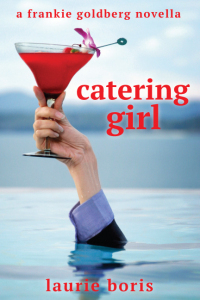A.L. Butcher's Blog, page 153
August 21, 2016
#GoodThings Blast Urban Fantasy
Title: Good Things, an Urban Fantasy Anthology
Publication Date: August 18, 2016
Genre: Urban Fantasy
Synopsis
Good things come from unexpected places…
Magic and mayhem. Vampires and gods. Cops and werewolves. The binding thread of mysticism in the modern world and acts of kindness, small and large, random and focused. Join these ten authors as we travel through their worlds.
All of the author proceeds from the sales of this anthology will go to the Random Acts Organization, sponsoring kindness throughout the world. This is not official Random Acts merchandise, but is a fundraising project under permission from the charity.
Author Bios
A. STAR (DIANTHA JONES)
Diantha Jones loves writing fantasy books filled with adventure, romance, and magic. She’s the author of the Oracle of Delphi series, the Mythos series, and the Djinn Order series (as A. Star). When she isn’t writing or working, she is reading or being hypnotized by Netflix. She is a serious night-owl and while everyone else is grinning in the warmth and sunlight, she’s hoping for gloominess and rain. Yeah, she’s weird like that.
ANGELA B. CHRYSLER
Angela B. Chrysler is a writer, logician, philosopher, and die-hard nerd who studies theology, historical linguistics, music composition, and medieval European history in New York with a dry sense of humor and an unusual sense of sarcasm. She lives in a garden with her family and cats.
In 2014, Ms. Chrysler founded Brain to Books: the marketing promotional engine and online Encyclopedia for authors. A passionate gardener and incurable cat lover, Ms. Chrysler spends her days drinking coffee and writing beside a volume of Edgar Allan Poe who strongly influences her style to this day. When Ms. Chrysler is not writing, she enables her addictions to all things nerdy, and reads everything she can get her hands on no matter the genre. Occasionally, she finds time to mother her three children and debate with her life-long friend who she eventually married. Her writing is often compared to Tad Williams. Her influences are Edgar Allan Poe, The Phantom of the Opera, and Frankenstein
J. KIM MCLEAN
Kim’ love of reading came after her mother introduced her to Tolkien and the Hobbit, followed by Lord of the Rings. She also lovingly blames her mother for her love of Science Fiction and Fantasy, thanks to being raised on Star Trek. Kim has always had a vivid imagination, but it wasn’t until she finished with graduate school (where she earned a Master’s of Science in Geology) that she found she could focus her imagination into creating her own characters and stories. Much of her writing has been for various play by email or forum role play universes, though Kim does hope this will be the first of many more stories she writes for publication.
When not writing, Kim can be found snowboarding, hiking, or doting on her furry beasts.
DARIEL RAYE
Dariel Raye is an award-winning author of powerful IR/MC (Interracial/Multi-cultural) paranormal romance and dark urban fantasy with alpha male heroes to die for and strong heroines with hearts worth winning. Her stories tell of shifters, vamps, angels, demons, and fey (the Vodouin variety). Dariel is currently writing three series: “Dark Sentinels” (wolf shifters), “Orlosian Warriors” (Vampire-like Nephilim), and “Gateway” (a crossover erotic paranormal suspense with romantic elements).
For more about Dariel, follow her blog or visit her website. She also publishes a new release newsletter. If you enjoyed this book, please post a review on review sites. You can also follow her and contact her on Twitter, Facebook, or Pinterest.
MIA DARIEN
Born a Connecticut Yankee in nobody’s court, Mia Darien grew up to brave snow and talk fast. She started reading when she was three and never looked back, soon frequently falling asleep with a book under her cheek. (Something she still does, though these days it?s her Nook as often as a paperback.)
At eleven, she discovered Night Mare by Piers Anthony and entered the world of grown-up fantasy fiction and it was all over from there. She started writing at fourteen, then met vampires as a teenager and the concept for what would become Adelheid was soon born. Epic fantasy remains her first love, but she enjoys writing whatever stories come to mind in any genre.
Now she loves both writing and helping her indie community with her freelancing. A geek till the end, she enjoys role-play by email games and World of Warcraft when she has the time. Married to her very own Named Man of the North, she lives with him, their mini-tank (also known as their son) and pets, who usually act more childish than the child.
ABIGAIL OWEN
Award-winning paranormal and contemporary romance author, Abigail Owen was born in Greeley, Colorado, and resides in Austin, Texas, with her husband and two adorable children who are the center of her universe.
Abigail grew up consuming books and exploring the world through her writing. A fourth generation graduate of Texas A&M University, she attempted to find a practical career related to her favorite pastime by earning a degree in English Rhetoric (Technical Writing). However, she swiftly discovered that writing without imagination is not nearly as fun as writing with it.
CRYSTAL G. SMITH
Born a small town Missourian, Crystal grew up in a time where reading was used for her escape from the everyday worries of a young girl. She then began developing ideas of how she would write a book and what she would do with her characters. Soon, idea came to typewriter and then thankfully computers.
Her love of reading is not centered on one specific genre, but with her writing, she has a tendency to stay with the romance genre. Whether it be modern day romance or paranormal romance, and a lot of steamy, she enjoys writing a story where characters find love in one another no matter how twisted their lives.
She has written several stories for charity to date and continues to write novellas and novels. She is an indie author with a large imagination and even larger heart. She is married with four children, (even though two of them have four legs). She works full-time as a pediatric nurse and when she isn’t acting goofy with family, you can find her reading or writing.
KAT JAMESON
Kat Jameson has been having just plain wicked thoughts for about as long as she’s been writing, so it seemed like a very natural progression that the two would end up together. She is a woman who seems perfectly average on the outside, but believes in a great capacity for the power of love and the joy of sex and thinks constraints should be put on neither so long as everyone involved is happy. So that’s what she writes about.
CHRISTI RIGBY
Christi Rigby lives in Colorado with her husband and her two teen boys, rounding out the group is a bernese mountain dog and an old orange cat that can’t seem to sleep in the morning past the need for some kibble at 5 am, then returns to the bed after it has been vacated but the owners. She has written a number of short stories for publication and is working on her first book to be published. When she is not writing at a keyboard she is always writing in her mind, so to say writing is her real life over the job she holds would be a fair representation. An avid guide along the path to geekdom for her children and friends, she is a fan of comic books, any number of Science Fiction/Fantasy television shows and movies, computer and console gaming, and just about anything Scandinavian or British Isles in nature. One day she hopes that her choice to make writing her life will lead to a visit to the Isle of Man.
JESSICA NICHOLLS
Jessica Nicholls is originally from Northern Illinois. She lived in the Northwest of England for just over ten years, where she studied and had her children. Jessica still lives overseas with her husband and two school age kids. Running, reading and watching films are her favourite hobbies. She loves spirits, passionate love stories, vampires, shape shifters, mythology and almost anything historical. The most important thing for her is for a story to feel real, something to genuinely escape into. Writing the type of stories she would enjoy reading is a passion.
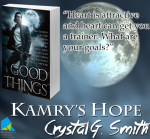

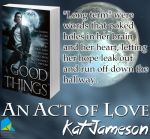
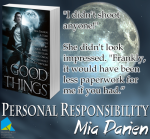
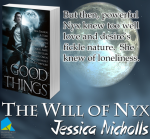
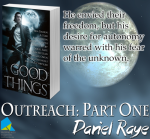
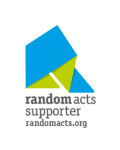
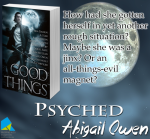
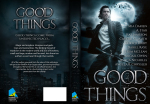


August 18, 2016
Interview with A. L. Butcher
Here’s my latest interview:)
Today I would like to welcome A. L. Butcher to the blog! She is the author of The Light Beyond the Storm Chronicles, Tales of Erana and several short stories.
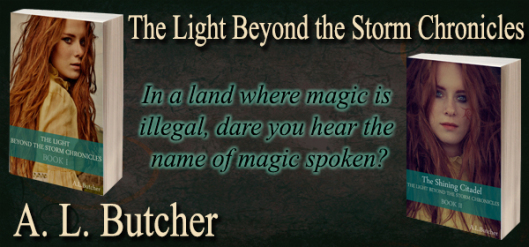 1. When did you first begin writing?
1. When did you first begin writing?
I learned to write before I went to school…. I guess you mean when did I start writing for pleasure? I’ve always been a writer- I think either you are or you aren’t. Being a good writer, and a published writer is a different kettle of fish. I’ve been writing poems and short stories as long as I can remember. Being bullied at school meant I soon became more comfortable in the company of imaginary friends, the worlds found in the pages of a book and the places in my head. At school I often ended up writing something for the school display, which always amused me as I have awful handwriting.
View original post 1,075 more words


August 15, 2016
Cover Makeover
Sometimes, the hardest part of change is admitting that you need some.
Okay, here I go (deep breath): some things about the way I’ve been marketing my books are not working. So I’m taking it one step at a time, looking at my book descriptions, keywords, categories, all those bits and bobs self-publishing authors have to learn about to help us become more visible to readers.
The first step in my evil plan to achieve world domination (or just, you know, sell a book or two) is to re-evaluate some of my covers. A lot of publishers refresh their books’ covers over time, as styles change, and I plan to do some of that. But this one cried out to me right away.
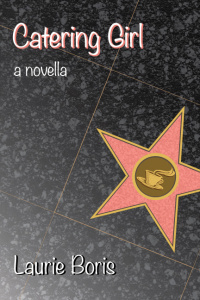 This girl needs a makeover.
This girl needs a makeover.
I liked the idea for the original cover for Catering Girl at first. But I think it might have been…
View original post 213 more words


August 14, 2016
Back Catalogue 7 – Interview
Originally posted here – http://www.bookwormiespot.com/2016/04...
Although I did notice the blogger seemed to think my name was Alexandra Archer – no idea where that came from!
Tell us a little about yourself and your background?
I’m A.L Butcher (Alexandra), a British fantasy author. I have a background in sociology, history, mythology and politics.
Thus far I have three novels in the Light Beyond the Storm Chronicles series: think sex and sorcery – it’s adult (definitely) fantasy/fantasy romance, several short stories set in the same world in the Tales of Erana series, and a number of other anthology pieces, including one in Heroika: Dragon Eaters – an exciting new anthology of heroic fiction from Perseid Press.
I’m working on a novella for Tales of Erana, a second edition of The Shining Citadel (Book II of the Chronicles) and Book IV of the series. Hopefully there might be a short horror collection this year – but as I have been saying that for the last 4 years don’t hold your breath!
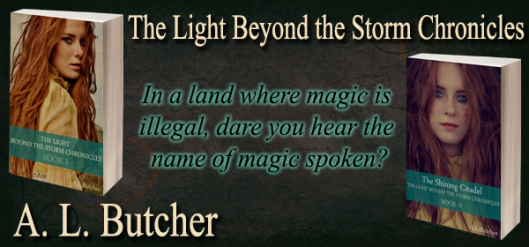
Series Banner
Which writers inspire you?
Lots – Alexandre Dumas, Gaston Leroux, Mary Shelley, Terry Pratchett, JRR Tolkien, Homer, Ellis Peters, Colin Wilson, Victor Hugo, Bram Stoker…..
Have you written any other novels in collaboration with other writers?
Novels no, short fiction yes. I’ve written historical style fantasy with author Diana L. Wicker. Outside the Walls is a tale of love in the aftermath of war, and courage to do what is right.
When did you decide to become a writer?
I always get asked this – I don’t think one ‘becomes’ a writer. It’s like any other form of art either you are an artist or you’re not. Painters paint, musicians play and writers write – even if it’s just for themselves. How many songs have been written that have never been played, or stories written that are never read? Thousands, maybe more. Just because the story wasn’t published doesn’t mean someone isn’t a writer.
I’ve always been creative, writing poems and short stories all my life. Poetry helps me cope – it can be a very evocative form of expression. I think I was what’s called ‘an imaginative child’ – which translates as doesn’t concentrate because she’s off in some other world. I spent a while writing fanfic and adventures for games. The novels sort of morphed from a project I’d written for something and never used.
Do you write full-time or part-time?
I have a full-time day job so I tend to write in the evening and at weekends.
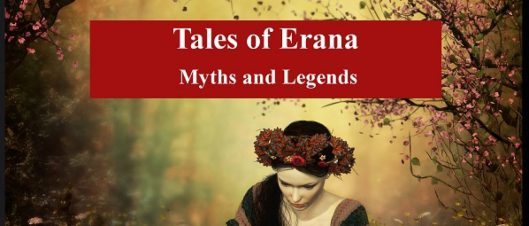
Tales of Erana
Do you work to an outline or plot or do you prefer just see where an idea takes you?
I tend to see where the adventure goes. I’ve tried outlining but I usually end up doing something else entirely so I let the story take me where it needs to go. Sometimes it doesn’t work, mostly it does.
Do you have a strategy for finding reviewers?
Not really. Readers will review – or not. Can’t make ‘em do it. As a I reader I don’t review every book I read, maybe 1 in 5. I try if it’s an indie author or I particularly liked a book, but not always.
What are your thoughts on good/bad reviews?
Reviews are a particular reader’s point of view. It might vary wildly from the opinion of the next reader. Not everyone has the same tastes, looks for the same thing from a book or interprets a book in a certain way. Negative reviews happen, get over it. If an author wants a review then they must take the good and bad. A review should be honest, if a reader doesn’t like a book then they don’t like it.
As an author it’s nice to be told someone likes your work but reviews are for readers. If an author isn’t confident in their work how can they expect a reader to be?
How can readers discover more about you and you work?
My blog or my author profiles on Good Reads and Amazon.
Blog: https://libraryoferana.wordpress.com/
Goodreads: https://www.goodreads.com/author/show/6430414.A_L_Butcher
http://www.amazon.co.uk/Alexandra-Butcher/e/B008BQFCC6/
Twitter:@libraryoferana
Facebook: https://www.facebook.com/DarkFantasyBeyondTheStorm
Any comments for the blog readers?
Fantasy and folklore are at the core of our cultures – every culture had and still has folklore and myth, storytelling and song. Of course now there are movies, miniseries, books, e-books, audio, plays, radio etc. and so the scope for it is vast. Think about it – within, say even just British culture we have King Arthur, St George, dragons, fairies, ghosts, Shuck, giants, monsters, Santa Claus, Easter Bunny, Tooth Fairy…. They may be stories we tell our kids, or were told as kids but they are still there ingrained in our culture. Look at the success of Harry Potter, Thor, Batman, Superman, Ironman, Lord of the Rings, the Hobbit… to a greater or lesser extent fantasy pervades and is very popular.
There are several places which claim to be Camelot, the Welsh flag has a dragon and dragonlore is big in Wales. We have the Giant’s Causeway, a few places called the Giant’s Seat, Giant’s Hill or whatnot. Of course some of the myths harken back to pre-Christian religions and beliefs, adapted Christian beliefs or simply a way for people to understand the universe. That’s part of the key though – it’s a way to understand the world – perhaps not our real world but pseudo worlds or alternate worlds. We follow heroes and antiheroes who are larger than life – gods, demigods, wizards, reluctant heroes, or even just the guy who is brave enough to step forward when the midden hits the windmill (thank you Frodo). We see part of ourselves in these heroes. It’s rarely as simple as good vs evil. Fantasy is an escape as much as anything else. For a while we find these people/creatures who slay the monster, bring the gifts, deal with the evil overlord – perhaps so we don’t have to.
Any feedback for me or the blog?
Erm….no I don’t think so.


August 12, 2016
Monsters and Myth – British Giants – Cormoran
Giants have been a feature in mythology and literature for centuries; Cormoran, Gog and Magog, Goliath, the giant slain by David, Polyphemus (see my post about cyclopes), the Brobdingnag giant, from Jonathan Swift’s Gulliver’s Travels, the giant from Jack and the Beanstalk and many more. Perhaps based on the discovery of huge bones and enormous stone ‘seats’ the mythology around this particular creature is diverse. After all, if you lived a thousand years ago, knew nothing of dinosaurs, or evolution, or science and you dug up a leg bone taller than yourself you might just think it was from a giant man.
For now, I am going to focus on some of the myths surrounding British giants, and their influence on my culture is everywhere. Here are but a few of our larger inhabitants, now lost in the fog of myth.
Today’s guest is Cormoran. He’s a Cornish giant, who features in Jack the Giant Killer, and gets a rum deal as the first giant slain by Jack, a farmer’s son, who is fed up with the local giant raiding his cattle. Luring the giant into a pit trap the wily lad then goes on to receive the giant’s wealth and magic sword. Continuing his adventures in the world of giant-slaying Jack goes on to slay a two-headed Welsh giant, is captured by Blunderbore, who has sworn revenge for Comoran’s death and held in an enchanted tower. The giant is no match for Jack and ends up as dead as his friend. Not content with this Jack works his way through the giants’ land, eventually rescuing a Duke’s daughter, whom he later marries. It’s the age old story of the simple lad (Jack, David etc.) overcoming adversity, monsters, wicked creatures and ending up rich and powerful, leaving a trail of bodies in his wake – albeit the bodies of said monsters.
So what of Cormoran – what’s his myth? Said to inhabit and to have built St Michael’s Mount, in Cornwall (which got its name because of a said vision of the Archangel in the 8th Century), he rather a feisty fellow, but not endowed in the brain department. ‘Of fierce and grim countenance’ (James Orchard Halliwell-Phillips 1861) the giant is known for terrorising the neighbourhood and making off with cattle and other livestock. Wading across the river he would steal half a dozen at a time, and tie sheep and pigs around his waist. Some folklore states there were two giants – who fought and killed one another – or the giant’s family also resided there. The giant was said to have six digits on each hand (which would have been useful in hauling rock, no doubt). And during an excavation a skeleton of a very tall man (7 feet or more) was found.
Cormelian was the giantess who also inhabited the caves and brought mayhem. Both the giants are thought to have fetched white granite from the neighbouring area and carried it ‘in their aprons’ to build a stronghold. One day when the male giant was asleep Cormelian tried to get closer greenstone, but awoke her husband, who kicked her, making her drop the stone which came to rest alongside the causeway. The, of course, Cormoran encountered a young farmer’s lad and his woes became far worse than a clumsy wife and marital abuse.
Cormoran is sometimes linked with Trencrom – and the two are believed to have thrown rocks back and forth at one another, unfortunately one hit the giant’s wife and killed her.
Interestingly the name Cormoran is NOT a Cornish name – it may be a corruption of Corineus – the legendary founder of Cornwall who was also said to have defeated the giant (Gogmagog) near the region of St Michael’s Mount, as told by Geoffrey of Monmouth’s great Historia Regum Britanniae. The base myth may have been of Brythonic (Celtic) origin, and King Arthur is believed to have smote a giant in roughly the same region.
Then came to [King Arthur] an husbandman … and told him how there was … a great giant which had slain, murdered and devoured much people of the country … [Arthur journeyed to the Mount, discovered the giant roasting dead children,] … and hailed him, saying … [A]rise and dress thee, thou glutton, for this day shalt thou die of my hand. Then the glutton anon started up, and took a great club in his hand, and smote at the king that his coronal fell to the earth. And the king hit him again that he carved his belly and cut off his genitours, that his guts and his entrails fell down to the ground. Then the giant threw away his club, and caught the king in his arms that he crushed his ribs … And then Arthur weltered and wrung, that he was other while under and another time above. And so weltering and wallowing they rolled down the hill till they came to the sea mark, and ever as they so weltered Arthur smote him with his dagger.
(Sir Thomas Malory in 1485 in the fifth chapter of the fifth book of Le Morte d’Arthur)
There will be more British giants to follow. Maybe the others will have more luck than our friend, the giant Cormoran…. But I doubt it.
SOURCES
https://en.wikipedia.org/wiki/Cormoran
https://en.wikipedia.org/wiki/Jack_the_Giant_Killer
The Lore of the Land (Westwood and Simpson 2006).
A Natural History of the Unnatural World (Jo Levy – Carroll and Brown, London)


August 7, 2016
Audio Book Narrator Interview 9 – Lauren Ezzo
*Name: Lauren Ezzo
*Tell us a bit about yourself: I was born and raised in East Lansing, MI. I’ve loved literature since I was little, and in 2014 received my BA in English/Theatre from Hope College in Holland, MI. Currently I’m a freelance narrator and actor based in the Midwest!
How did you become involved with audiobook narration and production? My first year out of college, a friend working a Brilliance Publishing sent me an audition notice. I went into their studio, read some Twilight and some Neil Gaimain, and was taken on! I thought if nothing else it’d be a fun new section on my resume. Two years later, and here we are!
What are you working on at present/Just finished? Just finished a book of poetry inspired by/chronicling The Donner Party! It’s called To Stay Alive: Mary Ann Graves and the Tragic Journey of The Donner Party. It’s a super interesting and emotional read — not to mention unorthodox! And it’s based on a real member of the party.
*Tell us about your process for narrating? The recording process itself depends on where/with whom I’m recording, but my prep is generally always the same: When I receive the manuscript I do a quick read/skim to see what I’m getting into. As recording approaches, I re-read several more times and jot down “specials” — words I’m unfamiliar with, specific author notes, place names, anything out of the ordinary. I consider each character leading up to the reading — where they fit in the story, and what sort of voice the author’s given them on paper. I love to communicate with authors in this regard — often their inspiration will ring a bell in my brain. Beyond that, lots of tea, coffee, and snacks.
What aspects do you find most enjoyable? Everything!!! I get paid to read!!!! I’m an actor first and foremost, so it’s a great challenge to see how much nuance and meaning I can imbue a story with using just my voice. I’ve learned so much about writing, storytelling, dialect, character, pacing….Also it’s a great conversation starter at parties.
Do you consider royalty share when looking for books to narrate? If not why is this? Oh yes! If the book is intriguing, royalty share is totally acceptable. I won’t turn down a book I really enjoy and have faith simply because the payment is royalty share. I’m not an author, but I can imagine that self-publishing takes just as much work as narration (and probably a bit more money). That being said, if an author can afford a PFH rate, I would recommend going this route. Narrators (myself included) are more likely to seek these titles out first, since they’re often paying second and third parties to record, edit, master, etc. Additionally, a seasoned narrator will typically only record with a PFH — but this is WELL worth the investment. You get what you pay for, and armchair narrators can definitely impact your audiobook’s sales.
Do you listen to audiobooks? I didn’t before I began recording, but I do now! I just finished Squirrel Meets Chipmunk by David Sedaris, which features Elaine Stritch. Hilarious.
*With many people owning MP3 players do you think this is the future of storytelling?Absolutely. Actually, just last month WSJ published an article confirming that audiobooks are the fastest growing publishing format in publishing! (I’m including the link below). Audiobooks, ebooks, smartphones, and the like will never replace flesh and blood books, but there is something to be said about audiobooks and the future of storytelling. Audiobooks create relationships; the performative aspect engages and it’s impossible to not respond to another human voice (even if it’s a negative response). Audiobooks are also becoming necessities — for those with learning disabilities like dyslexia or ADD, or corporate learning.
(http://www.wsj.com/articles/the-fastest-growing-format-in-publishing-audiobooks-1469139910 )
Why do you think audio books are becoming so popular?Convenience, and the human element. You don’t need to be stationary to listen to an audiobook…and having Sissy Spacek read To Kill a Mockingbird to you personally is pretty cool.
Can you remember the first audiobook you owned? My own! The CEO Buys In, by Nancy Herkness.
Please tell us a silly fact about yourself. How about two truths and a lie? I’m a Gemini, I bought a couch this week, I keep up with the Kardashians (I know, I know…) Get in touch with a correct guess and I will send you a prize!
Social Media links:
By all means, please follow, contact, and share! I love hearing from people[image error]
Website: www.laurenezzo.com
ACX: https://www.acx.com/narrator?p=A2BGEGYCIIX0EQ
Audible: http://www.audible.com/search?searchNarrator=Lauren+Ezzo
Twitter: @singlewithfries


August 4, 2016
Vampire Creed – Blog Tour – Interview
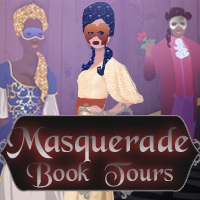
Title: Vampire Creed
Author: Rain Grey
Publication Dates: June 1, 2016
Genre: New Adult Paranormal Romance
Synopsis
Barnaby Blaine Rice was a Vampire born in the depression with a very special power to see who people truly were. After a long, empty existence of witnessing the darkest points of humanity, Blaine happens to encounter a beautiful married woman named Mary Slate. Unable to handle his love for the beautiful human, Blaine accidentally kills another Vampire over her and is put under a serious debt with the Vampire Council.
Blaine reluctantly forces himself to forget the woman and allows her to live her life without his intervention. It wasn’t until 50-years-later that the distant memories of the captivating Mary are brought back to the surface. Blaine has the pleasure to encounter the young Wendy Slate, granddaughter of Mary Slate after a criminal vampire keeps her hostage. Blaine got there in time to stop the criminal, but not to stop the beginning of Wendy’s transition into Vampirism.
As he was forced to sire her into this new world, he discovers that Wendy is the most amazing person he’d ever met. Wendy has to make a life-altering decision as Blaine has to deal with his blooming feelings for a woman who was identical to his first love. This modern love story introduces the most influential turning point of these lover’s lives.
Author Bio
Rain Grey is a psychologist by profession. However, she has been writing books since she was fifteen years old. She loves anything supernatural and her favourite genres are vampire romance and ghost fiction. Her home in England is close to the town of Stratford Upon Avon, where William Shakespeare was born.
Giveaway: There is a giveaway for this tour. One (1) $10 Amazon G.C. Ends 8/12. Open Internationally. Void where Prohibited.
http://www.rafflecopter.com/rafl/display/ff6a4f1f190/?
All interviews and spotlight materials will be sent separately.
Tell Us About Yourself
Please tell us a little about yourself.
I am a psychologist by profession and I live in England.
Would you kill for those you love?
No. But I would strive to protect them to the best of my ability.
Do you have any relationships you prize above others? Why
My daughter. She is everything to me.
Do you like animals? Do you have any pets/animal companions?
I love dogs. I used to have a Yorkshire Terrier.
Do you have any phobias?
I’m terrified of heights, snakes and mice.
Tell Us About Your World
Do you travel in the course of your adventures? If so where?
I have travelled extensively to Europe. USA and all Malaysia and Singapore.
Name and describe a food from your world.
The food is the same as our world. But sweet foods such as chocolate and ice cream being big favourites.
What is the technology level for your world/place of residence? What item would you not be able to live without?
It is modern day technology.
Name three persons of influence/renown within your society and tell why they are influential (Could be someone like Christ/Mandela/Queen Elizabeth or a renowned figure from a non-human/fantasy world.)
Gandhi – he is a man of peace
Leonardo DiVinci – a genius polymath
Queen Victoria – one of the most benevolent queens who ever lived.



Best-Selling Author @WestonAndrew Reveals His Top 10 Memories #scifi #PerseidPress
What a great interview:)
 POTL: All Things Books, Reading and Publishing
POTL: All Things Books, Reading and Publishing
Hi, my name is Andrew Weston. I’m an author living in a cupboard under the stairs…? Sorry, the darn medication must be off again. Truthfully? I like to spend my time fishing for dreams among the stars. I haven’t caught anything yet, so perhaps it’s time to change my bait?
Anyhow, as some of my readers will be aware, before turning my hand to writing, I experienced life’s rich tapestry as a specialist in the military, and later, as a police officer in a number of varied roles. Looking back over the years, I thought it might be fun to reveal my “Top Ten Memories” (Or, at least, those recollections I’m willing to share – hee hee).
They’re not necessarily in order, as I tried to group them together into little themes, but such experiences made me the person I am now, and in a strange way, have influenced my…
View original post 1,870 more words


August 3, 2016
Are You Living Up to Your Potential? #inspiration #motivation #affirmations
Are you living up to your potential? Each of us has incredible potential and has the capability of changing the world! It’s all a matter of believing in yourself and hard work! It’s too…
Source: Are You Living Up to Your Potential? #inspiration #motivation #affirmations


August 2, 2016
Audio Book Narrator Interview 8 – Michael Hanko
*Name: Michael (Mike) Hanko
*Tell us a bit about yourself:
How did you become involved with audiobook narration and production? I was a Communication major back in college, studying Radio and desktop publishing. I love music and so I spent 2 years on air as a DJ while in school. Loved it! But could not find any work in radio after school, given how competitive it is.
A little later on, I started a career as a Training Specialist. So again, being able to get in front of people and be in the public speaking arena was not a bad move. It helped me to work on and polish my delivery/style. This whole time, though I was always interested in voice and just a year ago I started my professional voice career.
Tell us about some of the titles you’ve narrated. Do you have a favourite amongst these? So far, I have produced 31 audiobooks (in just my first year professionally). They have mostly been self-help and inspiration/Christian projects. Some of my biggest sellers have been Listening (Christian Olsen) and the Happy Puppy Box Set (Charles Nelson and Jennifer Smith). I have enjoyed producing all types of works, including (recently) game guides and now even biographies.
Do you have a preferred genre? Do you have a genre you do not produce? Why is this? I don’t have a preferred genre. I truly just enjoy the different types of books that are published and trying to adapt my voice to some of them. The only style I don’t honestly do is adult/explicit material. And that’s because of my Christian faith. Just not a genre that I’m completely comfortable with.
What are you working on at present/Just finished? I have two biographies that I’m producing, both of NBA superstars. I had produced a similar title recently and the author and publisher have been super to work with, so I was happy to take on additional work from them. Also, I secured another scripturally based book that I will start shortly as well.
*Tell us about your process for narrating? (Be as elaborate as you like.) I look first for titles that I feel comfortable with. When I say that, I look for titles that fit me – adult, middle aged, midwestern accent (mine is not as pronounced though). But at the same time, I try to stretch myself by looking for titles that cause me to be more engaging or at least to strike a balance between more serious and more fun.
When I receive the manuscript, I will read it to try and get a feel for the tone, pacing, etc. I believe that any book’s translation/narration is that much more successful when I can make that connection. And just as important, when I’m editing the final tracks, I listen as a reader – is the volume good? Is the pacing and flow of the read good (not too fast or slow)? Are the pauses natural and help to convey the right tone? I love the process and hearing the project come together!
What aspects do you find most enjoyable? I love the read. I have loved reading since I was in elementary school. I was always one of the first kids to volunteer to read out loud. And I enjoy editing. I’m getting better all the time when it comes to that end and I love to challenge myself to make my edits better, to make the book sound more alive.
Do you consider royalty share when looking for books to narrate? If not why is this? I’ll consider any offer. All of my produced works have been royalty offers.
*With many people owning MP3 players do you think this is the future of storytelling? I do. We have amazing technology and I know many people that are audiobook readers. Technology is allowing us to reach people in many new and exciting ways.
Why do you think audio books are becoming so popular? You can take that book anywhere, just like traditional books. But, with the added advantage of listening in your car, as many people have suggested to me. You take the portability of a traditional book and add another flexible layer.
Has ACX/Audible fulfilled your expectations? (such as earnings, ease of use, workload etc.?) I’m still new to the industry (one year plus) but I enjoy seeing the numbers each month of sales, reviews, etc. ACX/Audible provides great tools and information for me as a narrator, making it easy for me to follow my own activity and to share in the overall success of the project. And their interface (receiving manuscripts, uploading, etc) is very user-friendly.
Have you ever had a negative experience producing a book? Just once. I felt very strongly that the author was being aggressive in their wording (within the book). And I did mention it to them. Although it did not ultimately affect the final product, I will speak up if I am not comfortable, that it will not benefit either them or me.
Please tell us a silly fact about yourself. I have a very dry sense of humor. So, I enjoy funny movies for example and especially those that are similarly dry and/or sarcastic.
Where can we learn more about you? I can be found on Facebook (artist page for my work), LinkedIn, Twitter and my own website, MikeHanko.com





